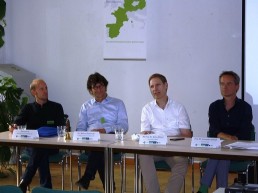31. May 2018
On 29 May 2018 the Independent Institute for Environmental Issues (UfU) e.V. held a workshop on „Sufficient Access to Justice in Environmental Matters in Germany?“ („Ausreichender Zugang zu Gericht in Umweltangelegenheiten?“). 22 participants discussed the challenges experienced with regard to access to justice in environmental matters. Amongst them ranked representatives from various environmental associations, representatives of the Federal Ministry for the Environment, the Federal Agency for Nature Conservation, laywers, judges and representatives from research and academia.
To begin the workshop, Karl Stracke, UfU, introduced the project and its main goals. Two keynote speeches followed: Prof. Dr. Alexander Schmidt, Hochschule Anhalt presented empirical results on the litigation practice of recognised environmental associations in Germany in the period of 2013-2016. RA Prof. Dr. Remo Klinger, Kanzlei Geulen und Klinger, Berlin, gave account on the current case law on standing in Germany.
During the subsequent discussion chaired by Dr. Michael Zschiesche, UfU, the participants especially identified the following aspects as the main difficulties and obstacles experienced with regard to access to justice in environmental matters in Germany:
After the 2017 amendment of the EAA (Environmental Appeals Act) many environmental issues remain outside the scope of its application. Those are for example strategic plans that are enacted by the legislator by law, lignite plans and wind energy plans, determination of air routes, annulment or amendment of ordinances on protected areas and product authorisations. Since national jurisprudence on the interpretation of the EAA remained inconsistent, E-NGOs often have to decide not to initiate proceedings due to the unclear admissibility situation. Another problem identified – resulting directly from the 2017 amendment of the EAA – was the newly introduced provision on “abusive or dishonest behaviour in appeal proceedings” (§ 5 EAA). Its unclear wording and the lack of any explanation of the underlying motivation posed an obstacle in many proceedings.
Another major challenge was seen in the immense costs for expert reports for judicial proceedings. And it was highlighted that standing in environmental matters for individuals is too restrictive and very limited under German procedural law.
The event was the kick-off workshop to the project „Access to Justice for a Greener Europe“, facilitated by the EU-LIFE programme.



